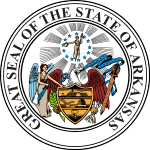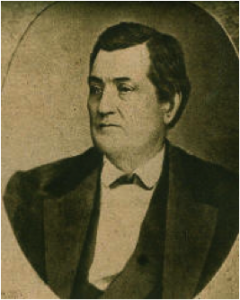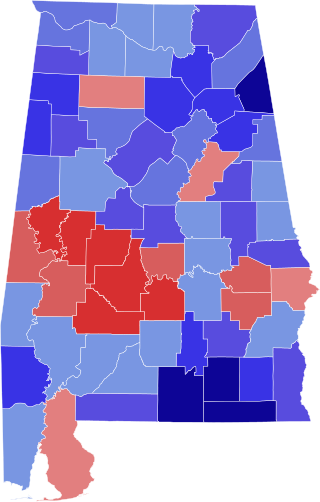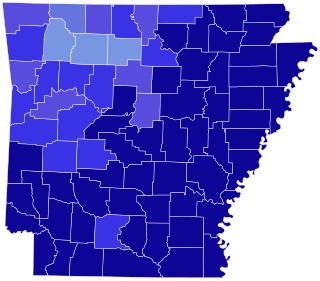Arkansas held a general election on October 13, 1874. The vote resulted in approval of a new Constitution of Arkansas and complete political realignment in the state to the Democratic Party, marking the end of the Reconstruction era in Arkansas.
| Elections in Arkansas |
|---|
 |
Arkansas held a general election on October 13, 1874. The vote resulted in approval of a new Constitution of Arkansas and complete political realignment in the state to the Democratic Party, marking the end of the Reconstruction era in Arkansas.
The vote took place as a midterm election during President Ulysses S. Grant's second term. As the Panic of 1873 and subsequent Long Depression, as well as executive branch scandals, began occupying the federal government and northerners, they withdrew from active involvement in Congressional Reconstruction. Grant's Amnesty Act allowed a coalition of reconstructed Democrats known as the redeemers to return to political power, some of which would use harassment, intimidation, and violence against black people and Republicans to ensure desired political outcomes.
The Brooks–Baxter War, having recently been resolved by Grant in favor of Governor of Arkansas Elisha Baxter (nominally a Republican), resulted in a call for the 1874 Arkansas Constitutional Convention. Largely drafted by Democrats and former Confederates, the new draft constitution was submitted to the voters of Arkansas on October 13. This constitution removed many unpopular provisions of the 1868 Constitution of Arkansas that had enabled Republican rule during Reconstruction: it reduced the power of the executive branch in Arkansas, delegated many powers to county government, limited state and local tax rates, and reduced gubernatorial terms from 4 to 2 years. [1]
The Democratic Party state convention took place in Little Rock on September 8-10, 1874, seeking to nominate a slate of candidates that would serve under the new constitution, if ratified.
Governor Baxter had won the 1872 gubernatorial election, and under the 1868 Constitution was serving a four-year gubernatorial term. Given the new constitution was reducing the gubernatorial term to two years, it was decided a new gubernatorial candidate be selected who would serve under the new constitution, if ratified. Party loyalty, sectional concerns and party unity were all discussed.
Baxter was a Republican but had become a hero for helping overthrow Republican rule and restoring ex-Confederates and Democrats to power in the state. [2] Democrats felt an obligation to allow him to "finish his term", which would have ended in 1876, for successfully opposing the Radical Republican elements of his own party. They also considered the appearance of not selecting Baxter upon the United States House of Representatives' Poland Committee, which had not yet delivered a report on the state government situation in Arkansas following the Brooks-Baxter War. [3]
Delegates from the northwest part of the state suggested David Walker, a former territorial and state legislator, Confederate military judge, and state supreme court justice from Fayetteville. But Walker was defeated in his pursuit to represent Washington County in the recent constitutional convention, which was taken by others as a sign his influence was waning. Many from the northwest part of the state strongly opposed nomination of Baxter to continue as governor. [4]
Former governor and Confederate Army colonel Harris Flanagin was also considered to have a high stature in the state. [5]
The typical convention rule requiring two-thirds for choosing a gubernatorial nominee was replaced by a simple majority over the objections of the northwestern delegates. Governor Elisha Baxter was selected as gubernatorial nominee on the first ballot, receiving 52 of 72 votes. Baxter declined "under the peculiar circumstances which exist", but was renominated a second time, now by acclamation. After a second Baxter refusal, the committee closed shortly after someone calling for August Garland received applause. [6]
The following day, Garland was selected unanimously, following withdrawal of several favorite son nominations. Garland was seen as a candidate capable of unifying northwestern Whig and conservative Democrats alongside Little Rock and Southwest Arkansas Democrats familiar with Garland's leadership. Walker was selected as an associate justice on the supreme court as part of a ticket that carefully balanced sectional concerns among the northwest, central, and southeast parts of the state. [7] Garland was a reluctant candidate, having refused the nomination in 1872 as below his stature, but accepted. [8]
The remainder of the ticket included: Simon P. Hughes for attorney general, Benton B. Beavers for secretary of state, William R. Miller for auditor, Thomas J. Churchill for treasurer, J. N. Smithee for land commissioner, Elbert H. English for Chief Justice of the Arkansas Supreme Court, and David Walker and William M. Harrison for Supreme Court associate justices. [9]
The position of lieutenant governor was abolished by the 1874 Arkansas Constitution.
Simon P. Hughes won election as Arkansas Attorney General unopposed.
Benton B. Beavers won election as Arkansas Secretary of State unopposed.
William R. Miller won election as Arkansas State Auditor unopposed. He had held the office from 1857 to 1860, 1861 to 1864, and from 1866 to 1868.
Thomas J. Churchill won election as Arkansas State Treasurer unopposed.
J. N. Smithee won election as Arkansas State Land Commissioner unopposed. Smithee was the first commissioner elected to the position after it became a constitutional office under the 1874 Constitution of Arkansas, which was adopted during the same election.
Elbert H. English won election as Chief Justice of the Arkansas Supreme Court unopposed.
David Walker and William M. Harrison were elected as the two associate justices on the Arkansas Supreme Court.

Powell Foulk Clayton was an American politician, diplomat, and businessman who served as the 9th governor of Arkansas from 1868 to 1871, as a Republican United States Senator for Arkansas from 1871 to 1877 and as United States Ambassador to Mexico from 1897 to 1905.

The Brooks–Baxter War, also known as the Brooks–Baxter Affair, Arkansas Civil War, or the Second American Civil War was an attempt made by failed gubernatorial candidate Joseph Brooks of the “Brindle-tail” faction of Arkansas' Republican Party to take control of the state from Elisha Baxter, who was the Republican governor. The victor in the end was the Baxter administration, also known as the "Minstrels", supported by some "carpetbaggers" and Democrats over the Brindle-tails supported by "scalawags" and "freedmen".

Elisha Baxter was an American businessman and politician who served as the 10th governor of Arkansas from 1873 to 1874.

Augustus Hill Garland was an American lawyer and Democratic politician from Arkansas, who initially opposed Arkansas' secession from the United States, but later served in both houses of the Congress of the Confederate States and the United States Senate, as well as becoming the 11th governor of Arkansas (1874–1877) and the 38th attorney general of the United States (1885–1889).
James Douglas Johnson, known as "Justice Jim" Johnson, was an Arkansas legislator and jurist known for outspoken support of racial segregation during the mid-20th century. He served as an associate justice of the Arkansas Supreme Court from 1959 to 1966, and in the Arkansas Senate from 1951 to 1957. Johnson unsuccessfully sought several elected positions, including Governor of Arkansas in 1956 and 1966, the United States Senate in 1968, and Chief Justice of the Arkansas Supreme Court in 1976, 1980, and 1984. A segregationist, Johnson was frequently compared to George Wallace of Alabama. He joined the Republican Party in 1983.

Oran Milo Roberts, was an American politician who served as the 17th Governor of Texas from January 21, 1879, to January 16, 1883. He was a member of the Democratic Party.
The Constitution of Arkansas is the primary organizing law for the U.S. state of Arkansas delineating the duties, powers, structures, and functions of the state government. Arkansas' original constitution was adopted at a constitutional convention held at Little Rock in advance of the territory's admission to the Union in 1836. In 1861 a constitution was adopted with succession. After the American Civil War its 1864 constitution was drafted. An 1868 constitution was passed to comply with the Reconstruction acts. The current constitution was ratified in 1874 following the Brooks–Baxter War.

The Democratic Party of Arkansas is the affiliate of the Democratic Party in the state of Arkansas. The current party chair is Grant Tennille. Former U.S. president Bill Clinton was born in Arkansas, and served as state governor from 1979 to 1981 and 1983 to 1992.

The Alabama Republican Party is the state affiliate of the Republican Party in Alabama. It is the dominant political party in Alabama. The state party is governed by the Alabama Republican Executive Committee. The committee usually meets twice a year. As of the February 23, 2019 meeting in Birmingham, the committee is composed of 463 members. Most of the committee's members are elected in district elections across Alabama. The district members are elected in the Republican Primary once every four years, with the most recent election for the committee having been on June 5, 2018. The new committee takes office following the general election in November 2018. In addition, all 67 county GOP chairmen have automatic seats as voting members. The state chairman can appoint 10 members. Each county committee can appoint bonus members based on a formula that theoretically could add 312 seats, although that formula currently calls for only about 50 seats.

The 1996 United States Senate election in Arkansas was held on November 5, 1996. Incumbent Democratic U.S. Senator David Pryor decided to retire. Republican Tim Hutchinson won the open seat, becoming the first Republican to win a U.S. Senate seat in Arkansas since Reconstruction in 1872 and the first to ever be popularly elected in the state. He was the first to win this seat since 1870. Hutchinson lost re-election in 2002 to David Pryor's son Mark Pryor.

The Arkansas Militia in Reconstruction was deeply involved in the ongoing civil disturbances which plagued the state until the late 1870s. In the immediate aftermath of the Civil War, the militia was first utilized by the white population to re-establish control over the newly freed black population. Radical Republicans seized control in 1867 and abolished existing state governments and militia organizations, and disenfranchised former Confederates. The new disenfranchised whites turned to the shadow Ku Klux Klan to attempt to maintain social order. The Reconstructionist government raised a new militia, primarily of black soldiers with white officers and utilized this new "Black militia" to put down the rising power of the Ku Klux Klan. Armed conflicts between rival parties continued in several counties and the militia was called to re-establish control in Pope and Scott Counties. The most severe conflict of this period occurred during the so-called Brooks–Baxter War with rival parties, with supporting militias, battling for control of the governorship. With the end of reconstruction one of the first acts of the new resurgent Democratic state legislature was to abolish the office of adjutant general in retaliation for the use of the militia to enforce the rule of the Reconstruction government.
The State government of Arkansas is divided into three branches: executive, legislative and judicial. These consist of the state governor's office, a bicameral state legislature known as the Arkansas General Assembly, and a state court system. The Arkansas Constitution delineates the structure and function of the state government. Since 1963, Arkansas has had four seats in the U.S. House of Representatives. Like all other states, it has two seats in the U.S. Senate.

The 1874 Alabama gubernatorial election took place on November 3, 1874, in order to elect the governor of Alabama. Incumbent Republican David P. Lewis unsuccessfully ran for reelection, losing to Democratic former U.S. Representative George S. Houston. This election would end an era of serious competition between the local Democratic and Republican parties, and start a 112-year win streak for Democrats in the gubernatorial level.

The 1932 Arkansas gubernatorial election was held on November 8, 1932, to elect the governor of Arkansas, concurrently with the election to Arkansas's Class III U.S. Senate seat, as well as other elections to the United States Senate in other states and elections to the United States House of Representatives and various state and local elections.

The 1930 Arkansas gubernatorial election was held on November 4, 1930, to elect the governor of Arkansas, concurrently with the election to Arkansas's Class II U.S. Senate seat, as well as other elections to the United States Senate in other states and elections to the United States House of Representatives and various state and local elections.

The 1888 Arkansas gubernatorial election was held on September 3, 1888.

David Walker was an American lawyer, politician, and judge and notable early settler of Fayetteville, Arkansas. Walker served on the Arkansas Supreme Court for a total of eight years, including two years as chief justice.

The 1872 Arkansas gubernatorial election was held on 5 November 1872, in order to elect the Governor of Arkansas. Republican nominee Elisha Baxter defeated Liberal Republican nominee Joseph Brooks. The results of the election led to the Brooks-Baxter War, in which Brooks unsuccessfully attempted to take control of the state government with force.
Thomas Daniel Webster Yonley was an American lawyer and Unionist who served as chief justice of the Arkansas Supreme Court from 1864 to 1866, and Arkansas Attorney General from 1873 to 1874.